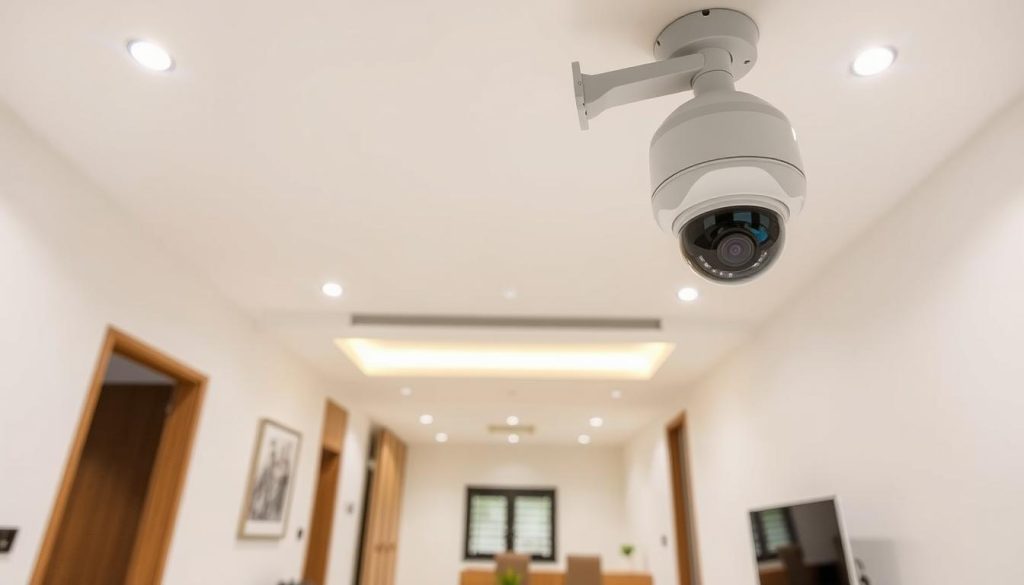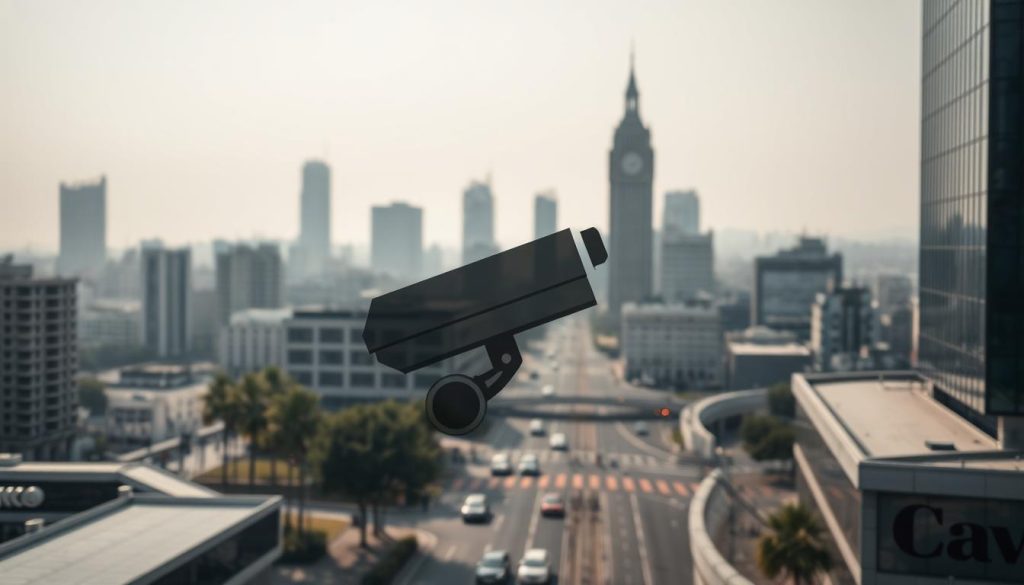CCTV cameras are becoming more common in Singapore for security. But, it’s important to know where they are not allowed. There are strict rules about where you can and can’t use these cameras. This is to protect privacy and follow the law.
This section will explain the rules about CCTV cameras in Singapore. We will focus on areas where cameras are not allowed. Knowing these rules is key to following the law and respecting privacy.
Key Takeaways
- CCTV regulations in Singapore dictate where cameras can be installed.
- Understanding prohibited areas for CCTV is critical for compliance.
- Privacy laws affect how CCTV is used in homes.
- Homeowners need to think about the law when setting up cameras.
- Knowing the CCTV laws in Singapore is important for residents.
Understanding CCTV Regulations in Singapore
The legal framework for CCTV in Singapore aims to balance security and privacy. Following the Singapore CCTV regulations helps ensure surveillance systems are used responsibly. Recently, HDB flat residents can install corridor-facing CCTV cameras without needing HDB approval, as long as they follow the HDB guidelines.
Even with these changes, homeowners must be careful about privacy. The surveillance laws require informing neighbors about CCTV installations. This helps maintain privacy while keeping communities safe. Landowners should also know the legal rules for residential areas to avoid legal issues.
It’s important to understand these rules before installing CCTV systems. For more information on permissions and compliance, check out this useful resource.
Common Areas with Restrictions on CCTV Installation
In many homes, like HDB flats, knowing about CCTV installation rules is key. Public area regulations control where you can put security cameras in shared spots. These rules help keep everyone’s privacy safe.
Putting cameras in places like hallways or shared rooms can cause arguments. To keep peace, talk to the Town Council before setting up cameras. Knowing the rules for shared spaces helps you make smart choices about security.
Talking openly with neighbors about installing cameras is a good idea. It makes sure everyone feels safe and respected. Remembering the value of privacy helps follow CCTV installation restrictions. This way, living together peacefully is easier.
Where are CCTV cameras not allowed?
It’s important for homeowners to know where they can’t use CCTV cameras. Laws protect our privacy, mainly in our homes. Installing cameras must respect our neighbors’ privacy and personal space.
Private Property and Neighbor Privacy
Homeowners need to think carefully about where they put their cameras. Cameras that watch over neighbors can lead to legal trouble. To avoid issues, homeowners should:
- Make sure cameras only watch their own property.
- Get permission from neighbors if cameras might see their property.
- Learn about privacy laws for surveillance in homes.
Legal Considerations in Residential Areas
There are rules about where and how cameras can be used. Breaking these rules can cause problems and legal issues. Homeowners should know the local laws to stay out of trouble. Important things to remember include:
- Know what surveillance is allowed in your area.
- Check local rules about camera types and where to put them.
- Talk to a lawyer if you’re not sure about following the rules.
Indoor Surveillance Restrictions
Indoor CCTV restrictions come from balancing security and privacy. Some home areas are seen as off-limits for cameras due to privacy concerns. Homeowners must be careful not to cross privacy lines while keeping their homes safe.
Areas of High Privacy Expectation
Bathrooms and bedrooms are where privacy matters most. Putting cameras in these spots can make family members feel uneasy. It’s key to respect these spaces to keep trust and harmony in the home.
Ethical Considerations for Homeowners
Choosing CCTV for home security raises tough questions. The goal is to protect family and property, but it’s important to think about privacy. Being open about surveillance helps build trust. Finding a balance between safety and privacy is a big responsibility for homeowners.
Public Spaces and Their Surveillance Laws
In Singapore, knowing the laws about public surveillance is key. It helps keep public areas safe and respectful. The rules for using CCTV in public places make sure everyone’s privacy is protected. This balance is important for keeping citizens safe.
CCTV cameras in public spots help prevent crime and keep people safe. You can find them in parks, streets, and public transport areas. It’s important to follow rules to avoid legal problems. Signs must be clear to tell people they are being watched, building trust.
Managing privacy is a big part of these rules. Authorities must not watch areas meant for privacy, like home windows. Those setting up CCTV have to protect people’s rights while keeping everyone safe. For more details, check out CCTV installation resources.
Installation Guidelines for HDB Flats
Homeowners in HDB flats need to know the rules for installing CCTV cameras. New rules make it easier to add security without needing approval first. It’s important to follow these guidelines to keep peace and respect among neighbors.
Key Compliance Requirements
Following the rules for CCTV camera installation is key. Here are some important points:
- Position cameras so they don’t invade neighbors’ privacy.
- Make sure cameras look at common areas, not private spaces.
- Get consent from neighbors if cameras are close.
Notification to Neighbors About Camera Installations
Telling neighbors about CCTV cameras helps build trust. It’s good to inform them to ease privacy worries and be open. Homeowners should:
- Share why the cameras are there.
- Start conversations about camera placement.
- Reassure them about privacy rules.

Impact of CCTV on Personal Privacy
CCTV systems have become common in our lives, raising big privacy concerns. They are meant to improve security, but they can also invade our privacy. This creates a tricky balance between feeling safe and keeping our personal freedoms.
In Singapore, people are more aware of privacy issues with CCTV. They worry about being watched all the time. This leads to talks about the right amount of monitoring.
It’s important to understand how surveillance affects our privacy. Finding a balance between security and privacy is hard. People need to know that while CCTV can prevent crime, it can also make us feel uneasy and distrustful.
Bathrooms and Changing Rooms: No-Go Zones for Cameras
Cameras are not allowed in bathrooms and changing rooms. These places are where privacy is most valued. People expect to be alone here, and cameras would break that trust.
Surveillance in changing rooms raises big ethical questions. It can invade personal space and challenge privacy. Ethical practices focus on respecting people’s dignity, even when they’re most vulnerable.
Breaking these rules can lead to serious legal trouble. It’s key to follow bathroom privacy laws. This way, everyone can feel safe and respected, without worrying about being watched.
Residents’ Rights and CCTV Usage
In places like Housing and Development Board (HDB) flats in Singapore, knowing your rights about CCTV is key. Homeowners must make sure their cameras respect everyone’s privacy. They need to follow rules to keep safety without crossing privacy lines.
It’s important to find a balance between feeling safe and being considerate of others. Being open about CCTV cameras helps build trust in the community. This is all about respecting privacy laws for everyone.
Knowing the laws about CCTV helps residents make good choices. It’s about protecting your rights while keeping others’ privacy safe. This way, living together becomes easier and safer for everyone.

